
ABOUT NORMAN LEBRECHT
NORMAN LEBRECHT IS A HISTORIAN, CULTURAL COMMENTATOR, BROADCASTER AND AWARD-WINNING NOVELIST.
His 12 books about music have been translated into 17 languages. Among the best-selling titles are The Maestro Myth, Who Killed Classical Music and Why Mahler?
Norman Lebrecht’s first novel The Song of Names won a Whitbread (now Costa) Award in 2003. It was filmed in 2018-19 with Tim Roth and Clive Owen in the leading roles.
His most recent history, Genius and Anxiety: How Jews Changed the World, 1847-1947, was published by Oneworld (UK) and Scribner in the US. His most recent book on music, Why Beethoven, was published by Oneworld (UK) and Pegasus (US) in 2020.
Two collections of Lebrecht essays have been published in China, the first by any western cultural commentator. A Lebrecht column appears monthly in The Critic and occasionally in The Spectator.
Slipped Disc, Norman Lebrecht’s blog, is the world’s #1 cultural news site, drawing 2 million readers every month.
Norman Lebrecht has lectured at cultural institutions and leading universities worldwide. He is a guest professor at the Shanghai Conservatoire of Music.

NORMAN LEBRECHT IS THE AUTHOR OF 12 WORKS OF NON-FICTION AND THREE NOVELS
His international bestsellers The Maestro Myth, Why Mahler, and The Life and Death of Classical Music have been translated into 17 languages.
-
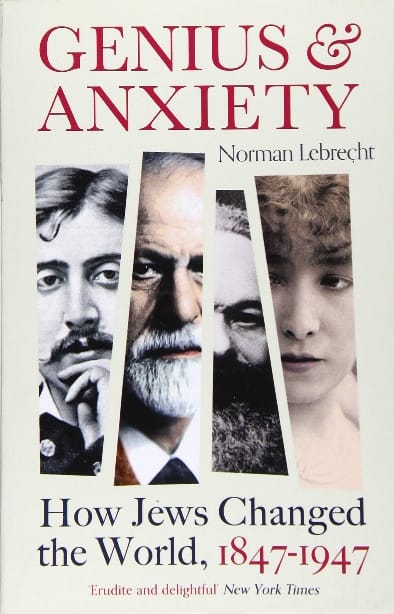
Genius and Anxiety: How Jews change the world 1847-1947
Oneworld/UK and Simon&Schuster/US, October 2019
Lorem ipsum dolor sit amet, consetetur sadipscing elitr, sed diam nonumy eirmod tempor invidunt ut labore et dolore magna aliquyam erat, sed diam voluptua. At vero eos et accusam et justo duo dolores et ea rebum. Stet clita kasd gubergren, no sea takimata sanctus est Lorem ipsum dolor sit amet. Lorem ipsum dolor sit amet, consetetur sadipscing elitr, sed diam nonumy eirmod tempor invidunt ut labore et dolore magna aliquyam erat, sed diam voluptua. At vero eos et accusam et justo duo dolores et ea rebum. Stet clita kasd gubergren, no sea takimata sanctus est Lorem ipsum dolor sit amet. Lorem ipsum dolor sit amet, consetetur sadipscing elitr, sed diam nonumy eirmod tempor invidunt ut labore et dolore magna aliquyam
-

The Game of Opposites
– 7 July 2009
“Ambitious. . . . A thought-provoking and complex look at one man’s Hamlet-like moral dilemma.” —Minneapolis Star-Tribune “Reading this novel is like hearing a familiar song in a startling new voice. . . . It pushes the reader beyond the simplistic safety zone of moral category (good, evil; moral, immoral) into complex, dramatically compelling terrain.” —John Burnham Schwartz
“Original and poignant. . . . Lebrecht is a fluid, beautiful writer. . . . He tackles a large moral dilemma and creates a page-turner from it.” —Baltimore Jewish Times
-

The Life and Death of Classical Music
(Vintage Books, US) – 1 March 2007
In this compulsively readable, fascinating, and often provocative guide to classical music, Norman Lebrecht, one of the world’s most widely read cultural commentators tells the story of the rise of the classical recording industry from Caruso’s first notes to the heyday of Bernstein, Glenn Gould, Callas and von Karajan.
Lebrecht compellingly demonstrates that classical recording has reached its end point—but this is not simply an exposé of decline and fall. It is, for the first time, the full story of a minor art form, analysing the cultural revolution brought about by Schnabel, Toscanini, Callas, Rattle, the Three Tenors and Charlotte Church. It is the story of how stars were made and broken by the record business; how a war criminal conspired with a concentration-camp victim to create a record empire; and how advancing technology, boardroom wars, public credulity and unscrupulous exploitation shaped the musical backdrop to our modern lives. The book ends with a suitable shrine to classical recording: the author’s critical selection of the 100 most important recordings—and the twenty most appalling. Filled with memorable incidents and unforgettable personalities—from Goddard Lieberson, legendary head of CBS Masterworks who signed his letters as God; to Georg Solti, who turned the Chicago Symphony into “ the loudest symphony on earth”—this is at once the captivating story of the life and death of classical recording and an opinioned, insider’s guide to appreciating the genre, now and for years to come.
-
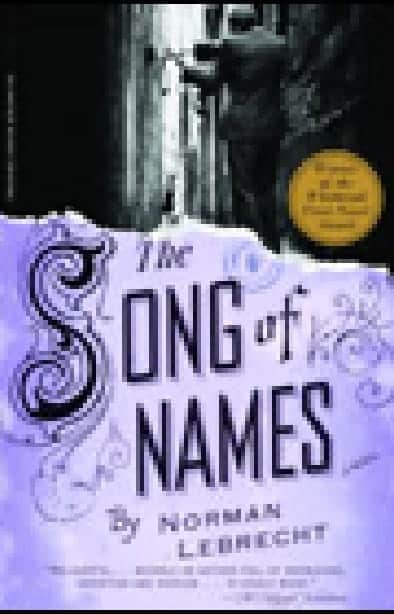
The Song of Names
Review – 3 February 2003
Two boys are growing up in wartime London. Martin is an only child, imprisoned in swottish loneliness. Then Dovidl enters his home, a refugee violinist from Warsaw. ‘I am genius,’ says Dovidl. ‘You have information. Together we make good team.’ His arrival brings merriment and love, mischief and menace. Blood-brothers, they roam the ruined city, finding tragedy and triumph, sex and crime. It is the time of their lives, their finest hour. Then Dovidl disappears, on the afternoon of his international debut. Martin is broken-hearted, his father near-bankrupted, the police dumbfounded. Where has he gone? How can a genius escape his date with destiny? How could he betray a brother? Martin is condemned to forty years of humdrum half-life until, one wintry night, an unexpected musical clue sets him on the trail to an astonishing act of self-discovery, and renewal.
-
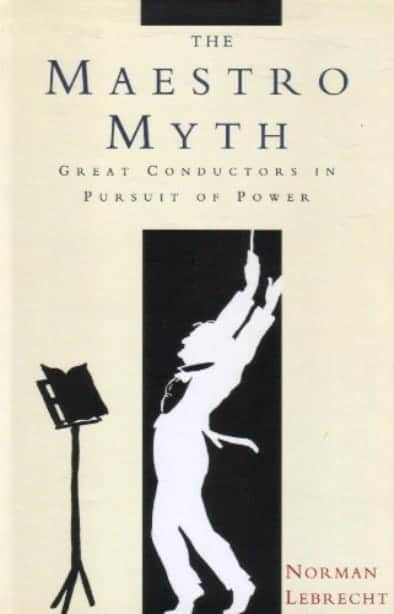
Maestro Myth: Great Conductors in Pursuit of Power
Replica Books – 1 July 2001
THE MAESTRO MYTH lifts the lid off the world off the mysterious world of conducting, a world populated by geniuses and charlatans and preyed upon by the greatest power brokers in the entertainment industry. A worldwide bestseller, with more than 150,000 copies sold in eleven languages, it has become standard reading for the new generation of conductors, many of whom have consulted the author on how to resist the temptations that have brought their profession to the brink of extinction.
-
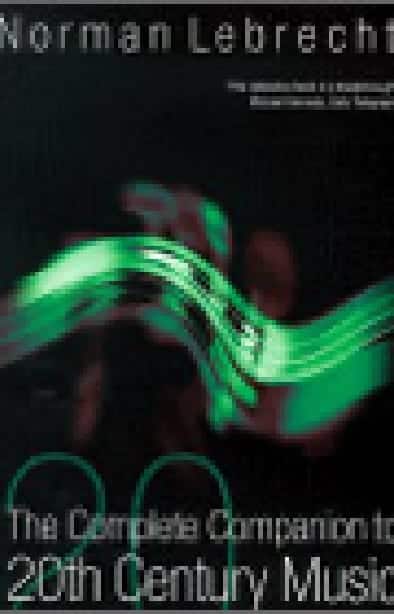
The Complete Companion to Twentieth-century Music
Simon & Schuster – 3 January 2000
THE COMPLETE COMPANION TO 20TH CENTURY MUSIC (published January 2000) is a comprehensive guide to the the gamut of composers, trends, fads and ideas that shaped the modern era. Written wittily and accessibly for non-specialist readers, it treats all music on merit alone, shining a flashlight into hidden corners of the art and sticking a pin into some of the more over-praised practitioners. ‘This reference book is a breakthrough,’ said Michael Kennedy, editor of the Oxford Companion to Music, reviewing the first edition. The greatly expanded COMPLETE COMPANION is even more ahead of its time, identifying the first musical buds of the new millennium.
-
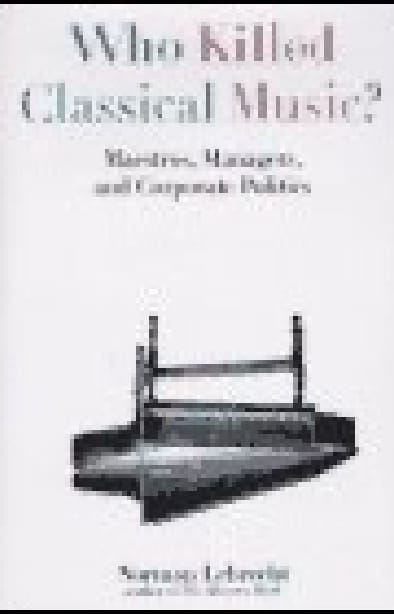
Who Killed Classical Music?: Maestros, Managers, and Corporate Politics
Birch Lane Press – 12 July 1997
Argues that commercialism has radically transformed classical music and opera.
-

When the Music Stops: Managers, Maestros and the Corporate Murder of Classical Music
Pocket Books – 7 July 1997
WHEN THE MUSIC STOPS (also known by its US title WHO KILLED CLASSICAL MUSIC) recounts the furtive history of the classical music industry, the powers behind the glory. From humble beginnings in the era of Liszt and Jenny Lind, the industry has made millionaires of three tenors and, in doing so, destroyed its own foundations. ‘Required reading for anyone interested in music,’ said Fiona Maddocks in The Spectator, WHEN THE MUSIC STOPS tells is as it is, naming the villains and the price by which fame can be bought.
-

The Companion to 20th-Century Music
Da Capo Press – 1 September 1996
20th-century music has been remarkable for its pluralism. The various styles – atonality, neo-classicism, serialism, jazz, computer music, minimalism, “happenings”, sheer chance – have been far from monolithic, and experimentation has been, perhaps, the century’s only defining feature. With over 2,500 entries, “The Companion to 20th-Century Music” comprehensively describes and celebrates this variety and innovation, assessing composers and musicians according to artistic merit rather than ideological or institutional eminen
-

Covent Garden: The Untold Story – Dispatches from the English Culture War,1945-2000
Simon & Schuster Inc – 1 October 19
At the end of the Second World War, the great economist Maynard Keynes called for public money to be poured into an Arts Council and Royal Opera House, as a means to revive our national fortunes and spirit through the English culture and language. At a time when bread was being rationed and London was a bombsite, money was found to create an opera and ballet company. Half a century later, with the country at its peak of prosperity, the Royal Opera House was pushed to the brink of bankruptcy. England’s cultural renaissance was over and multiculturalism, political correctness and European integration were throttling the very notion of Englishness. What went wrong? Covent Garden, The Untold Story relates, through the rise and fall of the Royal Opera House, the fruitless struggle to turn England into a cultural nation. Norman Lebrecht reports at vivid firsthand the unvarnished history of a vital institution which was designed to define a nation — and spectacularly failed.
-

Mahler Remembered (Composers Remembered Series)
Faber and Faber – 31 December 1987
Personal recollections and reminiscences of major composers from the memoirs of relatives, friends and fellow musicians (Bookseller Publications Buyer’s Guide)
-
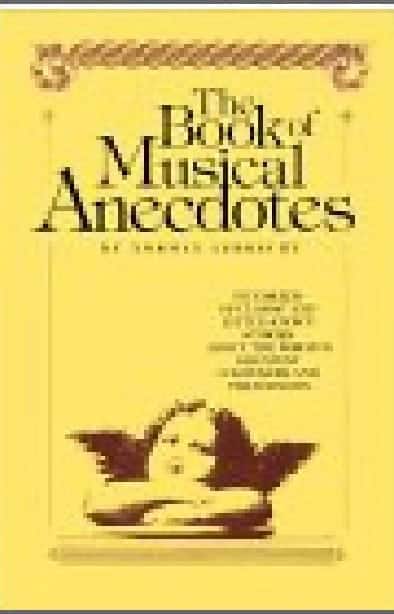
The Book of Musical Anecdotes
The Free Press – 1 December 1985
Here is one of the most enjoyable and illuminating books ever published for the music lover, a feast of delightful anecdotes that reveal the all-too-human side of the great composers and performers.
MORE ABOUT NORMAN
Norman Lebrecht is the author of 12 works of non-fiction and three novels. His international bestsellers The Maestro Myth, Why Mahler, and The Life and Death of Classical Music have been translated into 17 languages.
His latest history, Genius and Anxiety: how Jews changed the world 1847-1947, wll be published in October 2019 (Oneworld/UK, Simon&Scribner/US).
Norman Lebrecht’s first novel, The Song of Names, won a Whitbread Award in 2003. It has just been made into a major feature film, starring Tim Roth and Clive Owen, directed by Francois Girard.
Norman Lebrecht’s website, Slipped Disc, is the world’s #1 classical music noticeboard, with 1.5 million visitors each month.
In a 40-year journalistic career, Norman Lebrecht was a spiky columnist on the Daily Telegraph, presented lebrecht.live on BBC Radio 3 and served as Assistant Editor of the Evening Standard.
He now writes for the Spectator and the Wall Street Journal. Norman Lebrecht has taught at numerous universities, among them Yale, Syracuse, SUNY Buffalo, UMKC Kansas City, USC Los Angeles, Carnegie Mellon, Peabody/John Hopkins, Tel Aviv and Shanghai Conservatoire of Music.
Norman Lebrecht lives in central London and is writing another novel.
CONTACT INFORMATION
For all inquiries about Norman Lebrecht’s literary works,
translation and film rights, please contact:
-
Mail:
Bill Hamilton, Esq.
A M Heath & Company Limited, Authors’ Agents
6 Warwick Court
Holborn
London
WC1R 5DJ
-
Phone:
Tel. +44 (0) 207 242 2811
Fax. +44 (0) 207 242 2711
E-mail:
For other inquiries write to:
-
Blog:
MOST READ TODAY:
-
Orchestras
Top violinist tries to make sense of tariff confusion
You have to hand it to Patricia Kopatchinskaja,…

-
Orchestras
Long Island instrument store is accused of $2 million theft
From the New York Post: … An internationally-renowned…

-
News
King chooses Wells reject as his director of music
It bwas made known today that Alexander Hamilton…

-
Opera
Berlin loses Parsifal star
The Latvian mezzo-soprano Elīna Garanča has pulled out…
